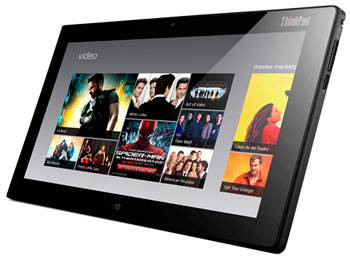
I was reading James Kendrick’s column on Windows 8 tablets over on ZDNet last week, and he is clearly having trouble adapting to what is becoming a tablet world. James and I came from the first age of personal computers. I’m pretty sure he’s younger than I am, and I think he is showcasing what will be a problem for many of us who grew up on PCs. Bigger is better, and tablets aren’t bigger. [*Correction – Aug. 13, 2012]
Now, on the other hand, I know of tons of kids who don’t even use PCs or tablets and live on their cellphones. For these whippersnappers, tablets are bigger, and while Windows 8 tablets may suck for us “old folks” — at least on iPad-size tablets — those who came up on cellphones should love it.
I’ll explore that this week and end with my product of the week: the Lenovo ThinkPad Tablet 2 — what may be the first iconic Windows 8 product.
Change Sucks
As we grow older, we becoming increasingly resistant to change. Typically people move far more often when they’re young than after 40, and getting people to relocate at 60 often seems impossible — even though it generally makes far more financial sense to do so at that time.
In my own case, from 20 to 40, I moved six times. Since then, I’ve moved once, and I’ve lived where I am longer than at any other place. Getting folks from the generations prior to my own to even use PCs has often felt like pulling teeth. The common recommendation is that if you have a cpmputer problem, find a 12-year-old to help you out.
The only problem is that the current generation of 12-year-olds may not know much more than you do, because they are living on smartphones and tablets.
So for Boomers, this move to tablets is likely going to come with some pain — but for millennials, it is likely to be ideal. One, they’ll accept change better; and two, it will be far more like what they are already using.
Size Is Relative
If you grow up in a large house, then any apartment feels tiny and cramped, even if it is a large one. If you grew up in a small apartment, chances are any house seems mammoth and spacy — even a small one. Size is relative.
On PCs, particularly desktop PCs, we’ve been drifting up to 27-inch displays. On notebooks, historically, anything less than 13.3-inches in display size hasn’t sold well.
However, on Smartphones 3.5 inches has recently expanded to the 4-inch range for displays, and there’s been a great deal of criticism of phones sporting 5-inch and 7-inch displays as simply too big to carry. The Web kind of sucks on small displays, but lugging around a 27-inch monitor isn’t really an option.
If you are coming from even 5 inches, then 10 inches is a massive improvement. Suddenly you can do things you didn’t think of doing. Granted, at least in the near term, folks probably won’t use these tablets as phones — though I wonder if that may change, given how many people I see now holding their phone in front of them and talking, and the new concerns about smartphones and cancer.
This suggests a 10-inch product as a primary offering would be just fine for Millennials, while older groups would continue to struggle. It may very well be that someone will need to launch a viable 13.3-inch tablet or finally bring to market a roll-up screen before tablets will be successful with older groups.
Touch Tech
The one change I don’t think will be an issue is touch. My wife, who was first to the iPad, often tries to poke holes in my laptop screen when we are working together. Touch is so intuitive that folks pick it up very easily but then have trouble moving back to a non-touch format.
This suggests that the sooner we have more touch monitors, touch laptops, and touch all-in-ones, the happier we are all likely to be. I’m starting to think that Touch TVs of some type may now be in our future — first in places like conference rooms and classrooms, and eventually, with some unique mounting or remote creativity, in our homes.
Wrapping Up
If Windows 8 is successful, the audience that will drive it will be on the young side of the market — likely 25 and younger — and the most resistant will be those older than 25. I don’t think blended products — oversized tablets, etc. — will fix this. Much like PCs eventually drove over the bodies of those who preferred terminals and typewriters in the 1980s, tablets eventually will drive over us older types in this round of change.
The question that will be answered this year is whether Microsoft or Apple will do the driving, or will both take a back seat to Google or some other company later on — much like IBM eventually took a back seat to Apple and Microsoft in the last round. Last time, I was one of the youngsters driving the change; this time, I’m one of the old farts being hit over the head with it. Personally, I liked it better the other way around. Now excuse me while I chase some kids off my lawn.
Product of the Week: The Lenovo ThinkPad Tablet 2 for Windows 8

Lenovo has really been upping its game this decade. It has generally been the fastest-growing PC company in a world that seems to think PCs are dead. Apparently, Lenovo never got that memo and is doing pretty damn well as a result. Last week, it announced its Windows 8 halo product, the Lenovo ThinkPad Tablet 2 for Windows 8. While the name could use a little work — I’m not a fan of sentence names in an iPad world — every other part of this offering is stunning.

The Lenovo Tablet 2 is the product that now sets the gold standard for Windows 8, in that it is lighter than the iPad, almost as thin, has similar battery life, and still runs a full suite of Windows products, including all the new ones from the Windows 8 app store.
Lenovo didn’t rip off any Apple designs either; its design language is an updated variant of the ThinkPad classic look.
Lenovo typically builds the most robust business laptops in the market, and I’m expecting similar things from this product, which also conforms to security and management requirements in large enterprises.
In the end, though, what really strikes me about this product is that it is the showcase of what should be the gold standard of a new compromise fully optimized Windows 8 offering. Lenovo set the bar for Windows 8 products, and that makes it my product of the week.
*ECT News Network editor’s note – Aug. 13, 2012: The original version of this article incorrectly named Ed Bott as the column’s author.























































I, too, AM a baby boomer. I turned 54 years old this past April. I was there during the birth of the PC and I embraced the personal computer as a hobby, which later became my profession. However, I grew up professionally in the world of IBM mainframes, working at a large telecom in the mid-Atlantic some 25 years ago.
Today, I work with Windows Servers and desktops. Fortunately for me, my professional focus was always in the area of software development, in particular in the area of applications developed in database software. A little over a decade ago, I began the transition from IBM mainframe-based database software to Microsoft’s server-based database software. I really enjoy working with this database software. It is extremely powerful, flexible and scalable.
Now that I’ve established my technical credentials, let’s talk about these wonderful new gizmos that have come out in the past 4 years. First of all, we have 3 laptops, 2 desktops in our household running the gamut of operating systems from Windows XP to Windows 7. That doesn’t include all the other electronic gadgetry, including the 5 flat-screen TVs in our household.
A little over two and a half years ago, I got my first Android phone. It was a bit limited due to it’s lack of serious processing power. However, I could see the potential. In December 2011, I got my new Android phone, sporting a dual-core 1.2 ghz processor, 4.3" screen, 1 gig of ram and a 32 gig SD card. This smartphone, as I keep telling my wife after I got her the identical Android phone for Valentine’s day, is a minature, high-speed computer that is always connected to the internet. These devices astound me and AM aze me, even though computers have been my hobby for 30 years.
My most recent acquisition is my Google Nexus 7, shared between me, my wife and my daughter. This 7 inch screen, with it’s Tegra 3 quad-core processor and Android 4.1 just flies. Between the PCs and the Android smartphones, this fills a void. It’s faster to catch up on news, email and web stuff than getting on the PC or laptop.
To me, it’s an AM azing technological time to be living in. It’s not just the hardware, but the cloud and the apps and software that live beyond the local devices that one uses to connect to the internet. I embrace these new inventions that allow a consumer of information, such as myself, to remain connected to the world, 24 x 7. And no, size does not matter, but connectivity and portability do. One of my PC’s at home is connected to my 37" HDTV. I love using it when I AM sitting in my mancave. However, my Android smartphone (high-speed ultra-portable computer) is with me in my pocket anytime, anywhere and always connected to the web:)
Yeah, its really all about what you are doing with it. You want to run a game where you can create content? Or even just write your own programs, and/or games? Well, don’t bother with your TV and a console, since neither will allow that. Want to play the most high end graphics, again, not console. Want to just play games, in general, online, between friends.. well, there is your console. Don’t need to play the latest games, or wrote code, or any of that stuff, tablets work, as long as you don’t mind that they still suck at entering new information, which isn’t video, voice, or pictures (sorry, give me a real keyboard.. hell, they even made those for the first pre-tablet Palm Pilots, because they knew data entry on these things sucks, and always will). But, yeah, I really don’t get cell phones. Would it be nice if mine had apps and internet activated on it? Sure, for some things, but data entry sucks even more on them, most of the apps suck, so do the games, etc. A tablet is far better, even though it won’t do what I need in many cases.
And, none of that even addresses the fact that even laptops are still "PCs" in the sense that you don’t have some jerk looking over your shoulder and telling you what you are allowed to use it for, what you can install, etc. Then bricking the thing on you, if you find a way around it.